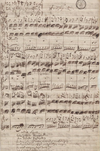Was Gott tut, das ist wohlgetan (BWV 100)
- Was Gott tut, das ist wohlgetan (BWV 100)
-
| Cantate BWV 100
Was tut Gott, das ist wohlgetan |
| Titre français |
Ce que Dieu fait est bien fait |
| Liturgie |
Trinité XV. |
| Création |
1732 ou 1735 |
| Auteur(s) du texte |
|
Samuel Rodigast
|
| Texte original |
|
Traduction française de M. Seiler
Traduction française note à note
Traduction française interlinéaire
|
| Effectif instrumental |
|
Soli : S A T B
chœur SATB
Cor d'harmonie I/II, timbale, flûte traversière, hautbois d'amour, violon I/II, violine, Violoncelle, alto, orgue, basse continue
|
| Partition complète [PDF]
Partition Piano/Voix [PDF]
|
|
Informations et discographie (en)
Informations en français (fr)
|
| Commentaires (en) |
Was tut Gott, das ist wohlgetan, (Ce que Dieu fait est bien fait) (BWV 100), est une cantate religieuse de Johann Sebastian Bach composée à Leipzig en 1732-1735 pour le 15e dimanche après la Trinité ou un jour arbitraire.
Le texte est de Samuel Rodigast (de) et la mélodie est basée sur son psaume homonyme.
Structure et instrumentation
La cantate est écrite pour deux cors d'harmonie, timbales, flûte traversière, hautbois d'amour, deux violons, violone, violoncelle, alto, orgue, basse continue, quatre solistes (soprano, alto, ténor, basse) et chœur à quatre voix.
Il y a cinq mouvements :
- chœur : Was Gott tut, das ist wohlgetan, seine Wille
- aria (soprano) : Was Gott tut, das ist wohlgetan, er wird mich wohl bedenken
- aria (basse) : Was Gott tut, das ist wohlgetan, er ist mein Licht und Leben
- aria (alto) : Was Gott tut, das its wohlgetan! Muss ich den Kelch gleich
- chœur : Was Gott tut, das ist wohlgetan, dabei will ich verbleiben
Référence
Voir aussi
Wikimedia Foundation.
2010.
Contenu soumis à la licence CC-BY-SA. Source : Article Was Gott tut, das ist wohlgetan (BWV 100) de Wikipédia en français (auteurs)
Regardez d'autres dictionnaires:
Was Gott tut, das ist wohlgetan, BWV 98 — Bachkantate Was Gott tut, das ist wohlgetan BWV: 98 Anlass: 21. Sonntag nach … Deutsch Wikipedia
Was Gott tut, das ist wohlgetan, BWV 99 — Bachkantate Was Gott tut, das ist wohlgetan BWV: 99 Anlass: 15. Sonntag nach … Deutsch Wikipedia
Was Gott tut, das ist wohlgetan (BWV 98) — Cantate BWV 98 Was Gott tut, das ist wohlgetan Titre français Ce que Dieu fait est bien fait I Liturgie Trinité XXI. Création 1726 Auteur(s) du texte 1 : Samuel Rodigast … Wikipédia en Français
Was Gott tut, das ist wohlgetan (BWV 99) — Cantate BWV 99 Was Gott tut, das ist wohlgetan Titre français Ce que Dieu fait est bien fait Liturgie 15e dimanche après la Trinité Création 1724 Auteur(s) du texte … Wikipédia en Français
Was Gott tut, das ist wohlgetan — Cette page d’homonymie répertorie les différentes œuvres portant le même titre. Was Gott tut, das ist wohlgetan correspond au titre de trois cantates de Johann Sebastian Bach : Was Gott tut, das ist wohlgetan (BWV 98) Was Gott tut, das … Wikipédia en Français
Catálogo BWV de Johann Sebastian Bach — Anexo:Catálogo BWV de Johann Sebastian Bach Saltar a navegación, búsqueda Para conocer los criterios de notación de este catálogo, véase BWV. Las 1127 obras del catálogo BWV de Johann Sebastian Bach se agrupan en dos grandes secciones: primero,… … Wikipedia Español
Die Elenden sollen essen, BWV 75 — Nikolaikirche, ca. 1850 Die Elenden sollen essen (The miserable shall eat), BWV 75, is a church cantata by Johann Sebastian Bach. Bach composed the cantata for the first Sunday after Trinity and first performed it in Leipzig on 30 May 1723. It is … Wikipedia
Nimm, was dein ist, und gehe hin, BWV 144 — The eleventh hour labourers, etching by Jan Luyken Nimm, was dein ist, und gehe hin (Take what is yours and go away.), BWV 144, is a church cantata by Johann Sebastian Bach. He wrote it in 1724 in Leipzig for the Sunday … Wikipedia
Nimm, was dein ist, und gehe hin — Cantate BWV 144 Nimm, was dein ist, und gehe hin Titre français Prends ce qui est à toi et va t en. Liturgie Septuagésime Création 1724 Texte original … Wikipédia en Français
Nimm, was dein ist, und gehe hin — Bachkantate Nimm, was dein ist, und gehe hin BWV: 144 Anlass … Deutsch Wikipedia

